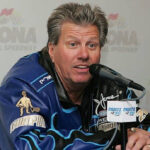John Barry remains one of the most celebrated and influential film composers of the 20th century. His distinctive scores, characterized by lush orchestrations, memorable melodies, and a touch of jazz sensibility, have graced some of cinema’s most beloved and enduring films. From the suave sophistication of James Bond to the sweeping landscapes of Africa, the music of John Barry elevated storytelling and left an indelible mark on the world of film. This exploration delves into the life and career of John Barry Film Composer, tracing his journey from a cinema-loving youth in York to an Oscar-winning maestro in Hollywood.
Barry’s early life was steeped in the world of cinema. Born John Barry Prendergast in 1933 in York, England, he was the youngest of three children. His father, Jack Prendergast, owned a chain of cinemas, providing young Barry with an immersive cinematic upbringing. By the age of fourteen, he was already proficient in the technical aspects of film presentation, capable of running the projection box at The Rialto cinema in York. This early exposure to films and their accompanying music ignited a passion within him. Even before finishing his education at St. Peter’s School, Barry knew his calling: to become a film music composer.
Formal musical training followed, starting with local piano and trumpet lessons. He then pursued more rigorous music theory under the tutelage of Dr Francis Jackson of York Minster and William Russo, a former arranger for Stan Kenton. This diverse musical education equipped him with the skills necessary to pursue his ambitions, though the path to a career in film music remained unclear.
A pivotal chapter in Barry’s early career was his three-year stint in the army as a bandsman. This experience, combined with playing in local jazz bands during his evenings, sparked the idea of forming his own musical group. This led to the creation of The John Barry Seven in 1957. The band quickly gained momentum through tours and television appearances, securing a recording contract with EMI. While their initial releases didn’t achieve chart success, Barry’s arranging and conducting talent was evident. EMI recognized his potential and provided him opportunities to arrange and conduct for other artists on their roster.
Alt: Young John Barry playing the trumpet, highlighting his early musical training and jazz influences.
A chance encounter with singer Adam Faith proved to be a turning point. Both were involved in a stage version of the BBC TV program “Six-Five Special.” Barry recommended Faith for a subsequent BBC TV series, “Drumbeat” in 1959. Faith, who had struggled with initial record releases, was offered a song called “What Do You Want?” by Johnny Worth, another performer on “Drumbeat.” Barry, with the help of JB7 pianist Les Reed, crafted an arrangement that perfectly complemented Faith’s vocal style. The song became a number one hit, propelling both Barry and Faith to stardom. Faith enjoyed a string of chart-topping hits, and The John Barry Seven also found success during the instrumental boom of the early 1960s with hits like “Hit & Miss,” “Walk Don’t Run,” and “Black Stockings.”
Adam Faith’s acting aspirations led him to a role in the British film “Beat Girl” (1960). Having arranged Faith’s recordings and “Drumbeat” performances, Barry was a natural choice to score Faith’s film debut. While “Beat Girl” wasn’t a cinematic masterpiece, it provided Barry with his first significant opportunity to demonstrate his burgeoning skills in film music composition. Despite the film and soundtrack’s commercial success, further film score offers were initially slow to materialize. However, Barry’s work on subsequent films like “Never Let Go” (1960) and “The Amorous Prawn” (1962) showcased his inventiveness and adaptability, establishing his reputation as a rising talent.
Alt: John Barry passionately conducting an orchestra, emphasizing his expertise and command in film score creation.
The summer of 1962 marked the beginning of his association with the James Bond franchise, a collaboration that would define a significant part of his career. Noel Rogers of United Artists Music approached Barry about contributing to the music for the first James Bond film, “Dr. No” (1962). Simultaneously, a connection with actor-writer-director Bryan Forbes further opened doors in cinema. Forbes commissioned Barry to write jazz pieces for his film “The L-Shaped Room” (1962). This modest start blossomed into a fruitful partnership, with Barry scoring five more Forbes films, including the critically acclaimed “Seance on a Wet Afternoon” (1964), “King Rat” (1965), and “Deadfall” (1968).
The 1960s proved to be a decade of remarkable success for John Barry film composer. Beyond his collaborations with Forbes, he scored five more James Bond films during this period, solidifying the iconic “James Bond Theme” and crafting memorable scores for “Goldfinger” (1964), “Thunderball” (1965), “You Only Live Twice” (1967), and “Diamonds Are Forever” (1971). His work on “Born Free” (1966) earned him his first two Academy Awards, followed by another Oscar for “The Lion in Winter” (1968). The decade concluded with the critically acclaimed score for “Midnight Cowboy” (1969), further demonstrating his versatility.
In the 1970s, Barry continued to explore diverse cinematic landscapes, scoring cult films like “Walkabout” (1971) and “Mary, Queen of Scots” (1971), the latter earning him another Oscar nomination. He also composed the iconic theme for the television series “The Persuaders!” (1971) and ventured into musical theatre with “Billy.” In 1974, seeking respite, he relocated to Majorca, initially declining film scoring opportunities. However, an invitation to score the American TV movie “Eleanor and Franklin” (1976) drew him back. This project led to a prolonged stay in Hollywood, during which he also scored “Robin and Marian” (1976) and “King Kong” (1976). His time on the West Coast extended to five years, a period that saw him marry his wife, Laurie, and further solidify his Hollywood career.
Alt: John Barry accepting an Oscar, symbolizing his Academy Award wins and critical acclaim as a film composer.
After a period of relative quiet in the late 1970s, John Barry film composer experienced a resurgence in the 1980s. He continued to experiment with diverse projects, balancing larger budget films like “Body Heat” (1981), “Out of Africa” (1985) (another Oscar win), and “The Cotton Club” (1984) with smaller, more intimate works. Other notable scores from this decade include “Frances” (1982), three more Bond films, and “Peggy Sue Got Married” (1986).
Following a serious illness in the late 1980s, Barry made a triumphant return, winning another Oscar for “Dances with Wolves” (1990) and receiving a nomination for “Chaplin” (1992). In the 1990s, he scored films like “Indecent Proposal” (1993), “My Life” (1993), and “Cry, the Beloved Country” (1995). He also released compilation albums “Moviola” and “Moviola II,” as well as non-soundtrack albums, showcasing his broader musical talents.
In the late 1990s, Barry returned to the concert stage, performing to sold-out audiences at the Royal Albert Hall. He made subsequent concert appearances, including guest conducting roles and concerts dedicated to his music. In 2004, he reunited with Don Black to write his fifth stage musical, “Brighton Rock.” In 2007, he was appointed Commander in the National Order of Arts and Letters by the French Minister for Culture.
John Barry continued to be active in music until his passing. In August 2008, he was working on a new album, “Seasons,” described as “a soundtrack of his life.” A biography, “John Barry: The Man with The Midas Touch,” was published in November 2008. John Barry died on January 30, 2011, at his home in Oyster Bay, New York, following a heart attack. His legacy as a John Barry film composer endures, his music continuing to captivate audiences and inspire generations of musicians and filmmakers alike. His contribution to cinema is undeniable, and his scores remain timeless masterpieces of the genre.


